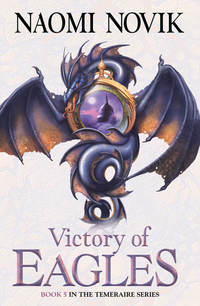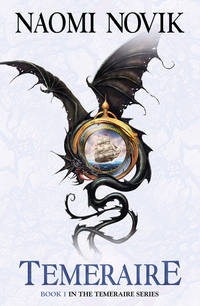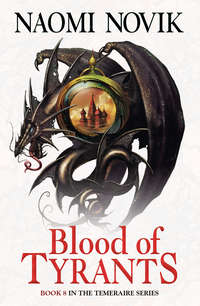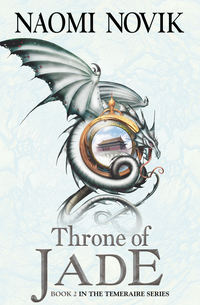
Полная версия
Black Powder War
They looked together down at the coat which Laurence had brought him as a pattern: more black than bottle-green now, with a peculiar white residue upon the buttons and smelling strongly of smoke and salt water both. The tailor did not say no outright, but his expression spoke volumes. ‘You take this,’ he said instead, and going into the back of his workshop brought out another garment: not a coat, precisely, but one of the quilted jackets such as the Chinese soldiers wore, like a tunic opening down the front, with a short upturned collar.
‘Oh, well—’ Laurence eyed it uneasily; it was made of silk, in a considerably brighter shade of green, and handsomely embroidered along the seams with scarlet and gold: the most he could say was that it was not as ornate as the formal robes to which he had been subjected on prior occasions.
But he and Granby were to dine with the commissioners of the East India Company that evening; he could not present himself half-dressed, or keep himself swathed in the heavy cloak which he had put on to come to the shop. He was glad enough to have the Chinese garment when, returning to his new quarters on shore, Dyer and Roland told him there was no proper coat to be had in town for any money whatsoever: not very surprising, as respectable gentlemen did not choose to look like aviators, and the dark green of their broadcloth was not a popular colour in the Western enclave.
‘Perhaps you will set a new fashion,’ Granby said, somewhere between mirth and consolation; a lanky fellow, he was himself wearing a coat seized from one of the hapless midwingmen, who having been quartered on the lower decks had not suffered the ruin of their own clothes. With an inch of wrist showing past his coat sleeves and his pale cheeks as usual flushed with sunburn, he looked at the moment rather younger than his twenty years and six, but at least no one would look askance. Laurence, being a good deal more broad-shouldered, could not rob any of the younger officers in the same manner, and though Riley had handsomely offered, Laurence did not mean to present himself in a blue coat, as if he were ashamed of being an aviator and wished to pass himself off as still a naval captain.
He and his crew were now quartered in a spacious house set directly upon the waterfront, the property of a local Dutch merchant more than happy to let it to them and remove his household to apartments farther into the town, where he would not have a dragon on his doorstep. Temeraire had been forced by the destruction of his dragondeck to sleep on the beach, much to the dismay of the Western inhabitants; to his own disgust as well, the shore being inhabited by small and irritating crabs which persisted in treating him like the rocks in which they made their homes and attempting to conceal themselves upon him while he slept.
Laurence and Granby paused to bid him farewell on their way to the dinner. Temeraire, at least, approved Laurence’s new costume; he thought the shade a pretty one, and admired the gold buttons and thread particularly. ‘And it looks handsome with the sword,’ he added, having nosed Laurence around in a circle the better to inspect him: the sword in question was his very own gift, and therefore in his estimation the most important part of the ensemble. It was also the one piece for which Laurence felt he need not blush: his shirt, thankfully hidden beneath the coat, not all the scrubbing in the world could save from disgrace; his breeches did not bear close examination; and as for his stockings, he had resorted to his tall Hessian boots.
They left Temeraire settling down to his own dinner under the protective eyes of a couple of midwingmen and a troop of soldiers under the arms of the East India Company, part of their private forces; Sir Thomas Staunton had loaned them to help guard Temeraire not from danger but overenthusiastic well-wishers. Unlike the Westerners who had fled their homes near the shore, the Chinese were not alarmed by dragons, living from childhood in their midst, and the tiny handful of Celestials so rarely left the Imperial precincts that to see one, and better yet to touch, was counted an honour and an assurance of good fortune.
Staunton had also arranged this dinner by way of offering the officers some entertainment and relief from their anxieties over the disaster, unaware that he would be putting the aviators to such desperate shifts in the article of clothing. Laurence had not liked to refuse the generous invitation for so trivial a reason, and had hoped to the last that he might find something more respectable to wear; now he came ruefully prepared to share his travails over the dinner table, and bear the amusement of the company.
His entrance was met with a polite if astonished silence, at first; but he had scarcely paid his respects to Sir Thomas and accepted a glass of wine before murmurs began. One of the older commissioners, a gentleman who liked to be deaf when he chose, said quite clearly, ‘Aviators and their starts; who knows what they will take into their heads next,’ which made Granby’s eyes glitter with suppressed anger; and a trick of the room made some less consciously indiscreet remarks audible also.
‘What do you suppose he means by it?’ inquired Mr. Chatham, a gentleman newly arrived from India, while eyeing Laurence with interest from the next window over; he was speaking in low voices with Mr. Grothing-Pyle, a portly man whose own interest was centred upon the clock, and in judging how soon they should go in to dinner.
‘Hm? Oh; he has a right to style himself an Oriental prince now if he likes,’ Grothing-Pyle said, shrugging, after an incurious glance over his shoulder. ‘And just as well for us too. Do you smell venison? I have not tasted venison in a year.’
Laurence turned his own face to the open window, appalled and offended in equal measure. Such an interpretation had never even occurred to him; his adoption by the Emperor had been purely and strictly pro forma, a matter of saving face for the Chinese, who had insisted that a Celestial might not be companion to any but a direct connection of the Imperial family; while on the British side it had been eagerly accepted as a painless means of resolving the dispute over the capture of Temeraire’s egg. Painless, at least, to everyone but Laurence, already in possession of one proud and imperious father, whose wrathful reaction to the adoption he anticipated with no small dismay. True, that consideration had not stopped him: he would have willingly accepted anything short of treason to avoid being parted from Temeraire. But he had certainly never sought or desired so signal and queer an honour, and to have men think him a ludicrous kind of social climber, who should value Oriental titles above his own birth, was deeply mortifying.
The embarrassment closed his mouth. He would have gladly shared the story behind his unusual clothing as an anecdote; as an excuse, never. He spoke shortly in reply to the few remarks offered him; anger made him pale and, if he had only known it, gave his face a cold, forbidding look, almost dangerous, which made conversation near him die down. He was ordinarily good-humoured in his expression, and though he was not darkly tanned, the many years labouring in the sun had given his looks a warm bronzed cast; the lines upon his face were mostly smiling: all the more contrast now. These men owed if not their lives, at least their fortunes to the success of the diplomatic mission to Peking, whose failure would have meant open warfare and an end to the China trade, and whose success had cost Laurence a blood-letting and the life of one of his men; he had not expected any sort of effusive thanks and would have spurned them if offered, but to meet with derision and incivility was something entirely different.
‘Shall we go in?’ Sir Thomas said, sooner than usual, and at the table he made every effort to break the uneasy atmosphere which had settled over the company: the butler was sent back to the cellar a half-dozen times, the wines growing more extravagant with each visit, and the food was excellent despite the limited resources accessible to Staunton’s cook: among the dishes was a very handsome fried carp, laid upon a ragout of the small crabs, now victims in their turn, and for centrepiece a pair of fat haunches of venison roasted, accompanied by a dish full of glowing jewel-red currant jelly.
The conversation flowed again; Laurence could not be insensible to Staunton’s real and sincere desire to see him and all the company comfortable, and he was not of an implacable temper to begin with; still less when encouraged with the best part of a glorious burgundy just come into its prime. No one had made any further remarks about coats or imperial relations, and after several courses, Laurence had thawed enough to apply himself with a will to a charming trifle assembled out of Naples biscuits and sponge-cake, with a rich brandied custard flavoured with orange, when a commotion outside the dining room began to intrude, and finally a single piercing shriek, like a woman’s cry, interrupted the increasingly loud and slurred conversation.
Silence fell, glasses stopped in mid-air, some chairs were pushed back; Staunton rose, a little wavering, and begged their pardon. Before he could go to investigate, the door was thrust abruptly open, Staunton’s anxious servant stumbling back into the room still protesting volubly in Chinese. He was gently but with complete firmness being pressed aside by another Oriental man, dressed in a padded jacket and a round, domed hat rising above a thick roll of dark wool; the stranger’s clothing was dusty and stained yellow in places, and not much like the usual native dress, and on his gauntleted hand perched an angry-looking eagle, brown and golden feathers ruffled up and a yellow eye glaring; it clacked its beak and shifted its perch uneasily, great talons puncturing the heavy block of padding.
When they had stared at him and he at them in turn, the stranger further astonished the room by saying, in pure drawing-room accents, ‘I beg your pardon, gentlemen, for interrupting your dinner; my errand cannot wait. Is Captain William Laurence here?’
Laurence was at first too bemused with wine and surprise to react; then he rose and stepped away from the table, to accept a sealed oilskin packet under the eagle’s unfriendly stare. ‘I thank you, sir,’ he said. At a second glance, the lean and angular face was not entirely Chinese: the eyes, though dark and faintly slanting, were rather more Western in shape, and the colour of his skin, much like polished teak wood, owed less to nature than to the sun.
The stranger inclined his head politely. ‘I am glad to have been of service.’ He did not smile, but there was a glint in his eye suggestive of amusement at the reaction of the room, which he was surely accustomed to provoking; he threw the company all a final glance, gave Staunton a small bow, and left as abruptly as he had come, going directly past a couple more of the servants who had come hurrying to the room in response to the noise.
‘Pray go and give Mr. Tharkay some refreshment,’ Staunton said to the servants in an undertone and sent them after him; meanwhile Laurence turned to his packet. The wax had been softened by the summer heat, the impression mostly lost, and the seal would not easily come away or break, pulling like soft candy and trailing sticky threads over his fingers. A single sheet within only, written from Dover in Admiral Lenton’s own hand, and in the abrupt style of formal orders: a single look was enough to take it in
… and you are hereby required without the loss of a Moment to proceed to Istanbul, there to receive by the Offices of Avraam Maden, in the service of H. M. Selim III, three Eggs now through agreement the Property of His Majesty’s Corps, to be secured against the Elements with all due care for their brooding and thence delivered straightaway to the charge of those Officers appointed to them, who shall await you at the covert at Dunbar …
The usual grim epilogues followed, herein neither you nor any of you shall fail, or answer the contrary at your peril; Laurence handed the letter to Granby, then nodded to him to pass the letter to Riley and to Staunton, who had joined them in the privacy of the library.
‘Laurence,’ Granby said, after handing it on, ‘we cannot sit here waiting for repairs with a months-long sea journey after that; we must get going at once.’
‘Well, how else do you mean to go?’ Riley said, looking up from the letter, which he was reading over Staunton’s shoulder. ‘There’s not another ship in port that could hold Temeraire’s weight for even a few hours; you can’t fly straight across the ocean without a place to rest.’
‘It’s not as though we were going to Nova Scotia, and could only go by sea,’ Granby said. ‘We must take the overland route instead.’
‘Oh, come now,’ Riley said impatiently.
‘Well, and why not?’ Granby demanded. ‘Even aside from the repairs, it’s going by sea that is out of the way, we lose ages having to circle around India. Instead we can make a straight shot across Tartary—’
‘Yes, and you can jump in the water and try to swim all the way to England, too,’ Riley said. ‘Sooner is better than late, but late is better than never; the Allegiance will get you home quicker than that.’
Laurence listened to their conversation with half an ear, reading the letter again with fresh attention. It was difficult to separate the true degree of urgency from the general tenor of a set of orders; but though dragon eggs might take a long time indeed to hatch, they were unpredictable and could not be left sitting indefinitely. ‘And we must consider, Tom,’ he said to Riley, ‘that it might easily be as much as five months’ sailing to Basra if we are unlucky in the way of weather, and from there we should have a flight overland to Istanbul in any case.’
‘And as likely to find three dragonets as three eggs at the end of it, no use at all,’ Granby said; when Laurence asked him, he gave as his firm opinion that the eggs could not be far from hatching; or at least not so far as to set their minds at ease. ‘There aren’t many breeds who go for longer than a couple of years in the shell,’ he explained, ‘and the Admiralty won’t have bought eggs less than halfway through their brooding: any younger than that, and you cannot be sure they will come off. We cannot lose the time; why they are sending us to get them instead of a crew from Gibraltar I don’t in the least understand.’
Laurence, less familiar with the various duty stations of the Corps, had not yet considered this possibility, and now it struck him also as odd that the task had been delegated to them, being so much further distant. ‘How long ought it take them to get to Istanbul from there?’ he asked, disquieted; even if much of the coast along the way were under French control, patrols could not be everywhere, and a single dragon flying should have been able to find places to rest.
‘Two weeks, perhaps a little less flying hard all the way,’ Granby said. ‘While I don’t suppose we can make it in less than a couple of months, ourselves, even going overland.’
Staunton, who had been listening anxiously to their deliberations, now interjected, ‘Then must not these orders by their very presence imply a certain lack of urgency? I dare say it has taken three months for the letter to come this far. A few months more, then, can hardly make a difference; otherwise the Corps would have sent someone nearer.’
‘If anyone nearer could be sent,’ Laurence said, grimly. England was hard-up enough for dragons that even one or two could not easily be spared in any sort of a crisis, certainly not for a month going and coming back, and certainly not a heavy-weight in Temeraire’s class. Bonaparte might once again be threatening invasion across the Channel, or launching attacks against the Mediterranean Fleet, leaving only Temeraire, and the handful of dragons stationed in Bombay and Madras, at any sort of liberty.
‘No,’ Laurence concluded, having contemplated these unpleasant possibilities, ‘I do not think we can make any such assumption, and in any case there are not two ways to read without the loss of a moment, not when Temeraire is certainly able to go. I know what I would think of a captain with such orders who lingered in port when tide and wind were with him.’
Seeing him thus beginning to lean towards a decision, Staunton at once began, ‘Captain, I beg you will not seriously consider taking so great a risk,’ while Riley, more blunt with nine years’ acquaintance behind him, said, ‘For God’s sake, Laurence, you cannot mean to do any such crazy thing.’
He added, ‘And I do not call it lingering in port, to wait for the Allegiance to be ready; if you like, taking the overland route should rather be like setting off headlong into a gale, when a week in port will bring clear skies.’
‘You make it sound as though we might as well slit our own throats as go,’ Granby exclaimed. ‘I don’t deny it would be awkward and dangerous with a caravan, lugging goods all across Creation, but with Temeraire, no one will give us any trouble, and we only need a place to drop for the night.’
‘And enough food for a dragon the size of a first-rate,’ Riley fired back.
Staunton, nodding, seized on this avenue at once. ‘I think you cannot understand the extreme desolation of the regions you would cross, nor their vastness.’ He hunted through his books and papers to find Laurence several maps of the region: an inhospitable place even on parchment, with only a few lonely small towns breaking up the stretches of nameless wasteland, great expanses of desert entrenched behind mountains, and on one dusty and crumbling chart a spidery old-fashioned hand had written heere ys no water 3 wekes in the empty yellow bowl of the desert. ‘Forgive me for speaking so strongly, but it is a reckless course, and I am convinced not one which the Admiralty can have meant you to follow.’
‘And I am convinced Lenton should never have conceived of our whistling six months down the wind,’ Granby said. ‘People do come and go overland; what about that fellow Marco Polo, and that nearly two centuries ago?’
‘Yes, and what about the Fitch and Newbery expedition, after him,’ Riley said. ‘Three dragons all lost in the mountains, in a five-day blizzard, through just such reckless behaviour—’
‘This man Tharkay, who brought the letter,’ Laurence said to Staunton, interrupting an exchange which bade fair to end in hot words, Riley’s tone growing rather sharp and Granby’s pale skin flushing up with tell-tale colour. ‘He came overland, did he not?’
‘I hope you do not mean to take him for your model,’ Staunton said. ‘One man can go where a group cannot, and manage on very little, particularly a rough adventurer such as he. More to the point, he risks only himself when he goes: you must consider that in your charge is an inexpressibly valuable dragon, whose loss must be of greater importance than even this mission.’
‘Oh, pray let us be gone at once,’ said the inexpressibly valuable dragon, when Laurence had carried the question, still unresolved, back to him. ‘It sounds very exciting to me.’ Temeraire was wide awake now in the relative cool of the evening, and his tail was twitching back and forth with enthusiasm, producing moderate walls of sand to either side upon the beach, not much above the height of a man. ‘What kind of dragons will the eggs be? Will they breathe fire?’
‘Lord, if they would only give us a Kazilik,’ Granby said. ‘But I expect it will be ordinary middle-weights: these kinds of bargains are made to bring a little fresh blood into the lines.’
‘How much more quickly would we be at home?’ Temeraire asked, cocking his head sideways so he could focus one eye upon the maps, which Laurence had laid out over the sand. ‘Why, only see how far out of our way the sailing takes us, Laurence, and it is not as though I must have wind always, as the ship does: we will be home again before the end of summer,’ an estimate as optimistic as it was unlikely, Temeraire not being able to judge the scale of the map so very well; but at least they would likely be in England again by late September, and that was an incentive almost powerful enough to overrule all caution.
‘And yet I cannot get past it,’ Laurence said. ‘We were assigned to the Allegiance, and Lenton must have assumed we would come home by her. To go haring off along the old silk roads has an impetuous flavour; and you need not try and tell me,’ he added repressively to Temeraire, ‘that there is nothing to worry about.’
‘But it cannot be so very dangerous,’ Temeraire said, undaunted. ‘It is not as though I were going to let you go off all alone, and get hurt.’
‘That you should face down an army to protect us I have no doubt,’ Laurence said, ‘but a gale in the mountains even you cannot defeat.’ Riley’s reminder of the ill-fated expedition lost in the Karakorum Pass had resonated unpleasantly. Laurence could envision all too clearly the consequences should they run into a deadly storm: Temeraire borne down by the frozen wind, wet snow and ice forming crusts upon the edges of his wings, beyond where any man of the crew could reach to break them loose; the whirling snow blinding them to the hazards of the cliff walls around them and turning them in circles; the dropping chill rendering him by insensible degrees heavier and more sluggish, and worse prey to the ice, with no shelter to be found. In such circumstances, Laurence would be forced to choose between ordering him to land, condemning him to a quicker death in hopes of sparing the lives of his men, or letting them all continue on the slow grinding road to destruction together: a horror beside which Laurence could contemplate death in battle with perfect equanimity.
‘So then the sooner we go the better, for having an easy crossing of it,’ Granby argued. ‘August will be better than October for avoiding blizzards.’
‘And for being roasted alive in the desert instead,’ Riley said.
Granby rounded on him. ‘I don’t mean to say,’ he said, with a smoldering look in his eye that belied his words, ‘that there is anything old-womanish in all these objections—’
‘For there is not, indeed,’ Laurence broke in sharply. ‘You are quite right, Tom; the danger is not a question of blizzards in particular, but that we have not the first understanding of the difficulties particular to the journey. And that we must remedy, first, before we engage either to go or to wait.’
‘If you offer the fellow money to guide you, of course he will say the road is safe,’ Riley said. ‘And then just as likely leave you halfway to nowhere, with no recourse.’
Staunton also tried again to dissuade Laurence, when he came seeking Tharkay’s direction the next morning. ‘He occasionally brings us letters, and sometimes will do errands for the Company in India,’ Staunton said. ‘His father was a gentleman, I believe a senior officer, and took some pains with his education; but still the man cannot be called reliable, for all the polish of his manners. His mother was a native woman, Thibetan or Nepalese, or something like; and he has spent the better part of his life in the wild places of the earth.’
‘For my part, I should rather have a guide half-British than one who can scarcely make himself understood,’ Granby said afterwards, as he and Laurence together picked their way along the back streets of Macau; the late rains were still puddled in the gutters, a thin slick of green overlaid on the stagnating waste. ‘And if Tharkay were not so much a gypsy he wouldn’t be of any use to us; it is no good complaining about that.’
At length they found Tharkay’s temporary quarters: a wretched little two-story house in the Chinese quarter with a drooping roof, held up mostly by its neighbours to either side, all of them leaning against one another like drunken old men, with a landlord who scowled before leading them within, muttering.
Tharkay was sitting in the central court of the house, feeding the eagle gobbets of raw flesh from a dish; the fingers of his left hand were marked with white scars where the savage beak had cut him on previous feedings, and a few small scratches bled freely now, unheeded. ‘Yes, I came overland,’ he said, to Laurence’s inquiry, ‘but I would not recommend you the same road, Captain; it is not a comfortable journey, when compared against sea travel.’ He did not interrupt his task, but held up another strip of meat for the eagle, which snatched it out of his fingers, glaring at them furiously with the dangling bloody ends hanging from its beak as it swallowed.






